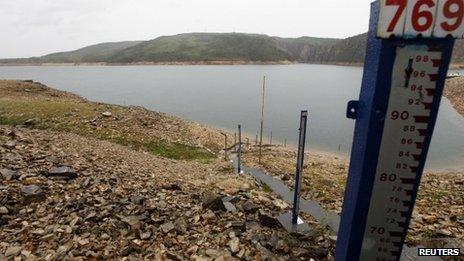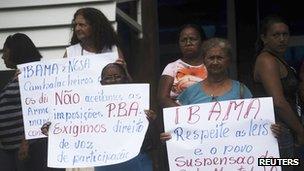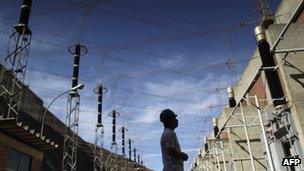Brazil drought stokes worries over energy shortages
- Published

A hot, dry summer has seen reservoir levels fall dramatically
Twelve years ago Brazilians across much of the country faced a stark choice: cut down on their energy use or be cut off completely.
The strict measures were part of the government's response to a severe drought that had led to a big drop in the production of hydroelectricity, Brazil's main source of energy.
And that stark choice might be looming again today, posing a big political headache for the government of President Dilma Rousseff.
Brazil's hydroelectric dams, which generate 67% of the country's power, have seen water levels dip to near critical levels.
Recent rains have helped ease the problem and the government insists there will not be any shortages.
"Not a single light bulb has gone out because of the energy situation," Energy Minister Edison Lobao told Reuters.
Analysts, however, are not so positive.

Building more hydroelectric dams has proved controversial
Over the past decade, more than 30 million Brazilians have been lifted out of poverty and that means far more homes with what used to be seen as luxury items: microwave ovens, washing machines and air conditioners.
Under President Luiz Inacio Lula da Silva, who was in office from 2003 to 2010, electricity consumption grew by 40%.
Brazil, long envied as one of the world's greenest power houses, embarked on an ambitious and sometimes controversial programme of building hydroelectric dams with smaller reservoirs, such as Belo Monte in the heart of the Amazon rain forest.
Indigenous Amazon communities say these dams change river flows and so threaten their way of life, while some experts have questioned how much dams affected by long periods of low rainfall can really add to Brazil's power grid.
Strikes by workers at some of the power plants have also slowed the pace of construction.
To have more flexibility in the power supply, the government has increased the construction of thermoelectric plants, mostly fired by natural gas and diesel. The generation capacity of these plants has almost tripled in a decade.
Soap operas
According to the latest data from Brazil's national grid operator (ONS), hydroelectric reservoirs in the heavily populated south-east and centre-west, which provide energy for the country's industrial hub, are operating at about 30% capacity.
A couple of weeks ago, President Rousseff described as "ridiculous" market rumours of a new energy crisis similar to the one which occurred in 2001.
Then a drought in the north-east of Brazil led to eight months of power rationing by the government.

Brazil used to depend on hydroelectricity for 90% of supplies - today it is 67%
Brazilians were obliged to cut back their power usage by a fifth under a government led "volunteer" rationing program. Those who did not had their power cut off.
It meant many people had to turn off their TV during their beloved evening soap operas, street lights were dimmed and firms shortened shifts in order to save energy.
That caused losses put at 54bn reais ($26bn; £16.5bn) to industry and hit economic growth.
The current government is adamant that shortages will not recur.
However, since Brazil switched on more gas-fired thermal plants in October, to cope with growing demand and ease the pressure on the hydroelectric power system, costs have increased significantly.
Political risk
Brazil has been forced to import more liquefied natural gas (LNG), paying a premium for the commodity, whose prices have soared in international markets.
According to analysts, this extra cost could derail President Rousseff's plans to cut electricity rates by 20% with a knock-on effect for Brazil's economy, which last year saw sluggish growth.
In turn, that could also put pressure on inflation, which has been on the rise in recent months.
Any energy rationing could also carry big political risks for Ms Rousseff and her Workers' Party, which made a public promise that the power cuts of 2001 would never happen again.
"Energy rationing, if put in place, would reduce Ms Rousseff's chances of re-election in 2014," says Ricardo Ismael, a political scientist at the Catholic University (PUC) in Rio de Janeiro told the BBC.
"Also it's worth remembering that she served as energy minister during the first years of former president Lula da Silva. So any energy related problems would of course be stuck to her image."
- Published21 September 2012
- Published12 May 2011